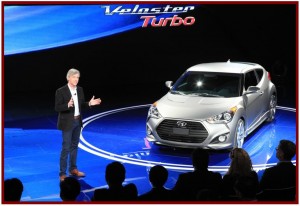
John Krafcik, then head of Hyundai in the U.S., at the 2012 NAIAS boasting about how green the company is. Critics disagree.
The Korean scofflaws Hyundai and Kia are fined a record $300 million penalty for selling vehicles that emit more greenhouse gases because of false fuel economy ratings. The controversial plea bargain will resolve “alleged” Clean Air Act violations. The false fuel-economy rating case comes from the sale of 1.2 million vehicles that will emit ~4.75 million metric tons of greenhouse gases in excess of what the automakers told the EPA over the estimated lifetime of the vehicles.
In November 2012, Hyundai and Kia responded to EPA’s findings by correcting the fuel economy ratings for many of their 2011, 2012 and 2013 model year vehicles and establishing a reimbursement program to compensate owners for increased fuel costs due to overstated fuel economy.
Hyundai and Kia overstated the fuel economy by one to as much as six miles per gallon, depending on the vehicle. These allegations concern the Hyundai Accent, Elantra, Veloster and Santa Fe vehicles and the Kia Rio and Soul vehicles. The announcement came as Hyundai Motor America said October sales of 50,081 units, a -6% decline versus the same period in 2013.
According to the EPA Fuel Economy Trends Report, Hyundai’s adjusted fuel economy ratings are 27.2 mpg for 2011, 28.3 mpg for 2012 and 29.0 mpg for 2013 model year vehicles. The Kia false ratings affected 300,000 2011-13 model year Kia vehicles.
However, are only fined $100 million in a civil penalty, albeit the largest in Clean Air Act history. At question was the false testing and certification of vehicles sold in the U.S. Critics say that Hyundai and Kia are in effect buying their way out of criminal penalties by spending $50 million on measures to prevent any future violations.
Hyundai and Kia will also forfeit 4.75 million-greenhouse gas emission credits that the companies previously claimed, which are estimated to be worth more than $200 million – hence the $3 million total number.
In a glaring loophole to the U.S. regulations, automakers earn greenhouse gas emissions credits for building vehicles with lower emissions than required by law. These credits can be used to offset emissions from less fuel-efficient vehicle models, sold, or traded to other automakers for the same purpose. The greenhouse gas emissions that the forfeited credits would have allowed are equal to the emissions from powering more than 433,000 homes for a year, according to EPA.
“Greenhouse gas emission laws protect the public from the dangers of climate change, and today’s action reinforces EPA’s commitment to see those laws through,” claimed EPA Administrator Gina McCarthy. “Businesses that play by the rules shouldn’t have to compete with those breaking the law. This settlement upholds the integrity of the nation’s fuel economy and greenhouse gas programs and supports all Americans who want to save fuel costs and reduce their environmental impact.”
The complaint was filed today jointly by the United States and the California Air Resources Board in the U.S. District Court for the District of Columbia. It alleges that the Hyundai and Kia companies sold close to 1.2 million cars and SUVs from model years 2012 and 2013 whose design specifications did not conform to the specifications the companies self-certified to the EPA. This led to the “misstatements.”
The ineffective federal regulatory bodies – EPA and DOT here – are not calling it the outright lying it was about fuel economy and the directly related greenhouse gas emissions that comes from burning fossil fuel.
In order to “reduce the likelihood” of future vehicle greenhouse gas emission miscalculations, Hyundai and Kia have agreed to reorganize their emissions certification group, revise test protocols, improve management of test data and enhance employee training before they conduct emissions testing to certify their model year 2017 vehicles. In the meantime, Hyundai and Kia must audit their fleets for model years 2015 and 2016 to ensure that vehicles sold to the public conform to the description and data provided to EPA.
As AutoInformed reported at the time, EPA discovered these violations in 2012 during audit testing after customer complaints. Subsequent investigation revealed that Hyundai’s and Kia’s testing protocol included numerous elements that led to false fuel economy ratings. In processing test data, Hyundai and Kia chose favorable results rather than average results from a large number of tests.
This case involves five different entities: Hyundai Motor Company, Hyundai Motor America, Kia Motors Corporation, Kia Motors America, and Hyundai America Technical Center, Inc.
The California Air Resources Board joined the United States as a co-plaintiff in this settlement, and will receive $6,343,400 of the $100 million civil penalty. The proposed consent decree is subject to a 30-day public comment period and almost certain rubber-stamp court review and approval. A copy of the consent decree is available on the Department of Justice website at http://www.justice.gov/enrd/Consent_Decrees.html.

